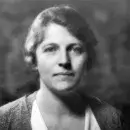
Pearl S. Buck
Pearl S. Buck was a novelist noted for works describing life in China. She is best known for The Good Earth (1931), the best-selling novel in the United States in 1931 and 1932, which earned her a Pulitzer Prize in 1932. In 1938, Buck became the first American woman to win the Nobel Prize in Literature “for her rich and truly epic descriptions of peasant life in China” and for her “masterpieces,” two memoir-biographies of her parents.
She was raised in Zhenjiang in eastern China by her Presbyterian missionary parents. Initially educated by her mother and a Chinese tutor, she later attended Randolph-Macon Woman’s College (B.A., 1914) and Cornell University (M.A. in literature, 1926). She returned to China and taught English literature in Chinese universities from 1925 to 1930.
The Good Earth, a poignant tale of a Chinese peasant, his slave-wife, and their struggle upward, established Buck as an interpreter of the East to the West and was adapted for stage and screen. The Good Earth, widely translated, was followed by Sons (1932) and A House Divided (1935); the trilogy was published as The House of Earth (1935). In 1949, in order to aid the mixed-race children fathered in Asia by U.S. servicemen, she cofounded an adoption agency, Welcome House. She also founded a child-sponsorship agency, the Pearl S. Buck Foundation (1964), and established Opportunity House to support cross-cultural understanding.
Her work includes a biography of her father, Absalom Sydenstricker (Fighting Angel, 1936), and of her mother, Caroline (The Exile, 1936). Later novels include Dragon Seed (1942) and Imperial Woman (1956). She also published collections of short stories, including The First Wife and Other Stories (1933), Far and Near (1947), and The Good Deed (1969); a nonfictional work, The Child Who Never Grew (1950), about her developmentally disabled daughter, Carol; an autobiography, My Several Worlds (1954); and a number of children’s books. Buck was active in the American civil rights, disability rights, and women’s rights movements. She published essays in Crisis, the journal of the NAACP, and Opportunity, the magazine of the Urban League. She served as a trustee of Howard University for twenty years, beginning in the early 1940s.